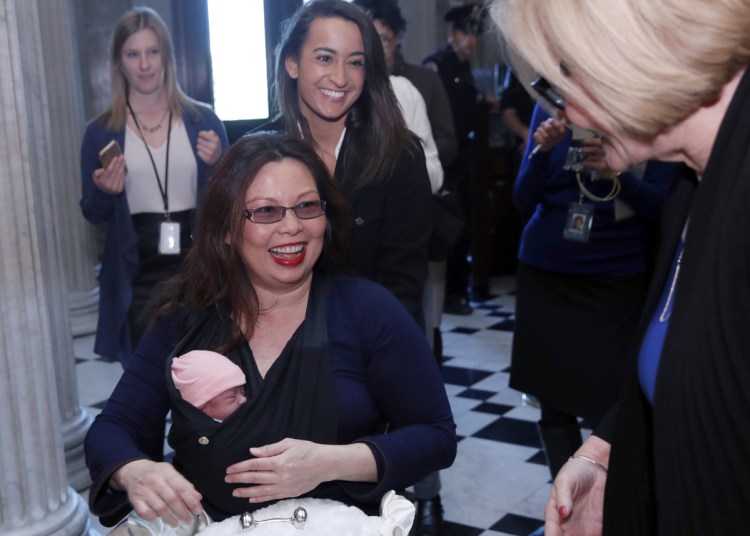WASHINGTON — Times are changing on Capitol Hill, where for the first time in history Thursday, an infant was permitted on the Senate floor.
At least Maile Bowlsbey, newborn daughter of Sen. Tammy Duckworth, D-Ill., didn’t ignore the dress code.
“She’s wearing a blazer!” Sen. Amy Klobuchar, D-Minn., exclaimed as Duckworth arrived, 10-day-old Maile in her arms, to vote against President Trump’s nominee for NASA administrator.
I may have to vote today, so Maile’s outfit is prepped. I made sure she has a jacket so she doesn’t violate the Senate floor dress code (which requires blazers). I’m not sure what the policy is on duckling onesies, but I think we’re ready pic.twitter.com/SsNHEuSVnY
— Tammy Duckworth (@SenDuckworth) April 19, 2018
The decision to allow Maile’s presence on the floor this week was the latest sign that the Senate’s increasing share of female members is pushing the institution to reconsider some of its conventions. But while the baby ban collapsed without a fight, it’s unclear whether other traditions can be felled so easily.
Since Duckworth confirmed her pregnancy in January, the upper chamber had been privately wracked with debate over how far it should go to accommodate lawmakers who have children while in office. Eventually, senators this week voted to allow children younger than 1 to accompany their parents to votes.
The change technically happened without opposition. But that did not stop some senators from grumbling about the possible consequences of loosening the rules.
“What if there are 10 babies on the floor of the Senate?” 84-year-old Republican Sen. Orrin Hatch of Utah asked a reporter this week, a comment that drew chastisement online.
Happy & honored to introduce Maile Pearl to my colleagues on the Senate floor while doing my job & serving the people of Illinois pic.twitter.com/clj9lrPouy
— Tammy Duckworth (@SenDuckworth) April 19, 2018
The senator, whose large extended family includes dozens of children, later clarified his statement. Having 10 babies on the Senate floor “would be a wonderful thing,” his office wrote on Twitter. “Senator Hatch supported the change.”
To some observers, the controversy was another sign of the culture clash slowly escalating within one of the U.S. government’s most hidebound institutions. The current Congress is among the oldest in recent history. So as the Senate gains more women – 23 now – and members under 50 begin to flex their power, divisions on matters like tradition, technology and gender can become inflamed.
Such tensions are not limited to children’s access to the Senate floor – the House has long allowed members’ kids inside the chamber – nor to changes favored by President Trump, such as ending the legislative filibuster.
On Thursday, 32 male senators joined their female colleagues to demand that the Senate update its system for reporting and adjudicating complaints of sexual harassment and other workplace misconduct in members’ offices.
While the House made such changes in February, the Senate failed to include them in a major spending bill last month, drawing criticism from female senators en masse. Leaders still have not moved to bring the Senate’s system in line with the House’s, which now provides greater support for accusers.
“If we are to lead by example, the Senate must revise current law to give the victims of sexual harassment and discrimination a more coherent, transparent, and fair process,” said a letter to Senate Majority Leader Mitch McConnell, R-Ky., and Minority Leader Chuck Schumer, D-N.Y.
It was signed by a single Republican, Sen. Ted Cruz, R-Texas, and every male senator apart from Schumer who caucuses with the Democrats.
“If we fail to act immediately to address this systemic problem in our own workplace, we will lose all credibility in the eyes of the American public,” they wrote.
By today’s standards, it can be hard to understand how traditional the Senate remains.
Unlike the House, there is no electronic mechanism for floor votes; every senator must indicate decisions to clerks one by one. Use of technology is limited in general, to the point where Budget Committee Chairman Mike Enzi, R-Wyo., once needed special permission to bring a laptop onto the floor during complex fiscal debates.
Some practices have received scrutiny specifically because of the presence of female members.
Consider the Senate swimming pool. The gym used by female senators does not have a pool, and the pool in the men’s gym used to ban women. The “men only” sign was in place because a handful of male senators liked to swim naked, female senators told reporters. That pool has since been opened to women.
Even finding an open restroom has been a problem for female lawmakers. House women didn’t have a bathroom directly off the floor until 2011. And while Senate women have had one since 1993, it had only two stalls until 2013.
It was perhaps this history that gave Duckworth’s arrival Thursday its air of minor triumph. As she entered the chamber with Maile, applause erupted, and colleagues gathered around her. Even McConnell and Schumer offered their best wishes – Schumer with a thumbs-up and McConnell with a little wave.
“I think it will do us good in the United States Senate every once in a while to see a pacifier next to the antique ink wells on our desk, or a diaper bag next to one of these brass spittoons,” Sen. Dick Durbin of Illinois the Democratic whip, said this week on the floor.
He added that the Senate certainly reveres history – “but part of our history is recognizing change.”
Send questions/comments to the editors.


